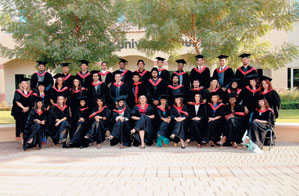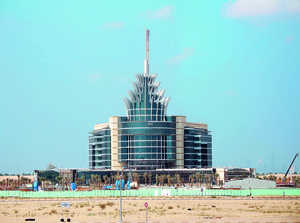
Dissemination /Middlesex UniversityGraduation at Middlesex University’s Dubai campus, opened in 2005Dissemination /Middlesex University
A 2.3 square kilometer enclave on the outskirts of Dubai, one of the seven United Arab Emirates, has become a type of free zone for international quality education in an area where, just a few decades ago, there was nothing but desert. Over the last three years, at least two dozen universities from countries such as the United States, the United Kingdom, Australia, Belgium and India have opened branches of their campuses in the area, which has been given the name of Dubai International Academic City. In the second half of this year, two new participants will open their doors in Dubai: Michigan State University and the Rochester Institute of Technology, from the state of New York, both of whose headquarters are almost ready. These two will join institutions such as Australia’s Murdoch University International, which is known for its programs in the media and communications area; Hult International Business School, which offers MBA courses in business and finance in Boston, along with the London-based Middlesex University. Harvard is also present in the Emirate. Its medical school set up a hospital and a research foundation in an area that was created in 2002 to house high quality hospitals and clinics.
In the academic city, about 10 thousand students attend courses that take from one to four years, in areas such as engineering, computer science, fashion and design, biotechnology, environment, and business. The aim is to increase this figure to 30 thousand over the next five years. “The ever growing list of institutions shows that we will be a regional base for top-tier higher education”, celebrates Ayoub Kazim, the city’s executive director.

Dissemination /msu
Construction of buildings at Michigan State University…Dissemination /msuWhat is happening in Dubai symbolizes a new trend among world-class universities. Their strategies to become international, justified by the need to prepare students for a globalized world and to attract international talent, are no longer limited as they were previously to exchange programs, the setting up of research networks or distance-learning courses. The number of institutions that are setting up branches abroad is growing, particularly in the Middle East. In Doha, the capital of Qatar, one can study medicine at an advanced Cornell campus or computer science at a branch of another American institution, Carnegie Mellon University. In 2010, New York University will open a campus dedicated to the arts and humanities in Abu Dhabi, the largest of the Arab emirates, after having received a US$ 50 million endowment from the emirate’s sheik.
This trend is fueled by the large endowments that are being offered to the institutions. In the case of Dubai, the international universities are attracted by a whole package of advantages, including total exemption from taxes, guaranteed repatriation in full of money earned, and a minimum of red-tape for students, teachers and employees coming from outside. Not to mention the infrastructure of the academic district, which has restaurants, movie theatres, sports gyms and leisure areas. The intention of the Sheik of Dubai, Mohammed Al-Maktoum, is to turn the country into a center for foreign students. Unlike its neighbors, the emirate has little petroleum, and its ruler’s ambition is to turn it into a major tourism and technology center. In addition to the construction of hotels with exotic architecture and the reclaiming of a piece of its coastline in the shape of a palm tree, the government has set up Internet City. Inaugurated in 2000, it includes facilities of a number of companies, such as Microsoft, Siemens and IBM. The government is also planning to set up a center for pharmaceutical laboratories. US$ 10 billion was set aside for the academic district project. Dubai has 1.5 million inhabitants spread over an area of less than 3.8 thousand square kilometers – little more than twice the area of the city of São Paulo.

Dissemination /rit
…and the Rochester Institute of TechnologyDissemination /ritDiplomatic assets
Although the universities that have campuses abroad insist that they are offering the same quality of tuition as that provided at their main campuses, many employees and professors are being hired locally, with short-term contracts. “Many of these university managers are trying to present themselves as being benevolent and altruistic when, in reality, what they really want is to rake in the money”, declared Congresswoman Dana Rohrabacher, a republican for the state of California, and a critic of this wave of internationalization, to the newspaper The New York Times. David Skorton, President of Cornell University, advocates this strategy and says that it benefits the United States. “Higher education is the most important diplomatic asset that we have. I believe these programs can reduce the degree of friction between countries and cultures”, declared Skorton.
There is nothing new about world-class education turning into sought-after merchandise and perhaps the United States is the country that is best qualified to sell it. Foreign students admitted to North American universities brought in US$ 14.5 billion into the US economy last year with school fees, living expenses and book purchases, US$ 1 billion more than the year before. This figure could be even higher were it not for the increase in restrictions on the entry of foreign students in the wake of the attacks of September 11, 2001. The main hindrances affected students from the Middle East, whose numbers dropped by 10% in 2002 and another 9% in 2003, only returning to pre-9/11 levels last year. Opening campuses abroad is nothing more than a way of meeting this demand without encouraging immigration.
Republish
